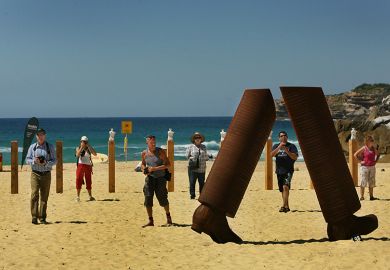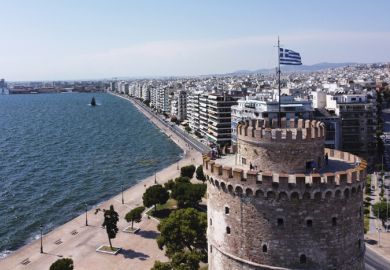It has been a stormy few months for the US-based Semester at Sea programme, which for over 50 years has taken undergraduates on a round-the-world voyage while they continue their university education.
Run since 1976 by the private, not-for-profit Institute for Shipboard Education and currently in partnership with the University of Virginia, the programme has a rich history of exposing students to an array of cultures while forming friendships for life on board a cruise ship.
However, in July it was reported that the ISE had signed a “standstill agreement” with a bank in Germany to prevent action by creditors after payments on an $83.5 million (£52 million) loan for its ship, MV Explorer, were missed. The agreement required the ISE to pay $400,000 up front and $100,000 each month as the institute attempted to sell the vessel.
Lauren Judge, ISE director of public affairs, told Times Higher Education that the organisation is “current on all financial obligations” and not in a precarious financial situation.
She added that the organisation ended the 2013-14 fiscal year with “positive operating results”, improving the financial condition reflected in ISE’s balance sheet over that of the previous year.
Ms Judge said the sale of the ship – which it then plans to charter from the new owner, or charter another ship – would mean the ISE would revert to “its original and sustainable…business model” of two Semester at Sea voyages each year.
ISE purchased MV Explorer in 2007 after 45 years of leasing vessels. But rising fuel costs and the impact of the economic crisis on registrations are among the reasons for selling the ship, according to the ISE website.
The organisation is also on the lookout for a new academic partner, after it was announced in June that the University of Virginia is to end its sponsorship of the programme from May 2016.
A statement from the ISE said that the two parties, which began working together in 2006, “mutually agreed” that the time was right to “explore other opportunities”. All voyages scheduled will proceed as planned, the statement said.
That decision follows the sponsorship agreement that preceded the tie-up with Virginia ending when the University of Pittsburgh pulled out after 24 years, citing safety concerns. Pittsburgh provost James Maher also said that suggestions for improvements to the programme had been ignored.
In a further problem for the programme, it recently faced a legal case after a Virginia student participating in Semester at Sea, 22-year-old Casey Schulman, died when she was hit by a boat propeller as she swam in Dominica in December 2012. The university said the swimming excursion with friends had been organised independently of Semester at Sea.
However, Ms Schulman’s family sued the ISE over the death in a federal court in Miami, reaching a confidential settlement in February this year.
Despite the metaphorical choppy waters, the latest Semester at Sea voyage set sail from Southampton in August, with 629 students from 31 different countries and 251 colleges and universities on board. It will visit 15 countries and 17 ports before arriving in Florida, where the journey ends, on 8 December.
Opportunity for adventure
The cost of spending a semester at sea varies based on whether a cabin is a double or triple berth, and has a porthole or not. Fees for autumn 2014 range from $23,950 to $29,950, although the ISE’s website says it awards $4 million in financial aid annually.
Caroline Howe, 20, who is majoring in communication studies at the University of San Diego, is one of the students on board for the latest trip. She picked her university specifically because of the opportunity to spend a semester at sea, and she says she has not been disappointed.
“I have a travel bug and a semester filled with 15 countries and various cultures was just the medicine I needed,” she said – although she conceded that some “cabin fever” was to be expected.
“I think the hardest times on this ship will bring all of us together. We have no place to go, we cannot run, so we might as well learn to communicate and grow from any trouble that may occur,” she said.
Fellow student Stephen Goodell, 36, a foreign affairs major at the University of Virginia, was similarly optimistic. “I believe it takes a certain kind of personality to embark on a voyage like this,” he said. “To read about a culture or political event, and then to go and see first-hand what it is like is a remarkable way to fully understand and comprehend what is taught in classes.”
Mr Goodell added that firm friendships were being made on board. “I have my cabin for down time and alone time if and when I need it, but there are enough people on board to talk with.”
Kenn Gaither, associate dean and associate professor in the School of Communications at Elon University in North Carolina, became president and chief executive of the ISE in July. He has joined nine semesters at sea during his long association with the organisation and these trips have yielded many nautical anecdotes.
“One thing that binds together a community [is] the inevitable cultural mishaps from travelling to so many countries in such a short period of time,” Professor Gaither said.
“For example, a student once asked a local woman in Cadiz, Spain for directions. The student thought she was explaining to the Spanish woman that the students live on a ship, but told the woman that they were living in a shoe.”
Register to continue
Why register?
- Registration is free and only takes a moment
- Once registered, you can read 3 articles a month
- Sign up for our newsletter
Subscribe
Or subscribe for unlimited access to:
- Unlimited access to news, views, insights & reviews
- Digital editions
- Digital access to THE’s university and college rankings analysis
Already registered or a current subscriber? Login





